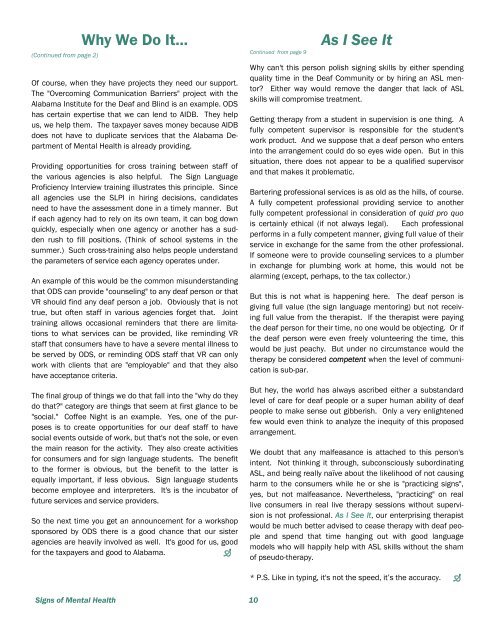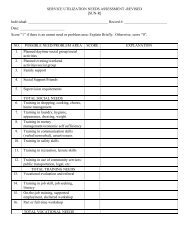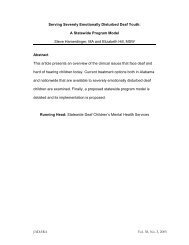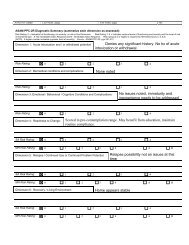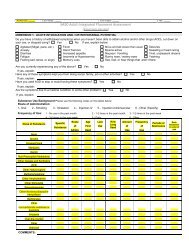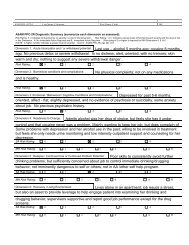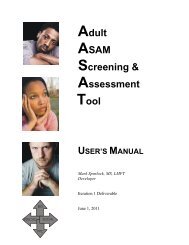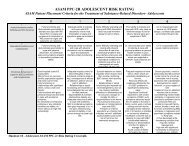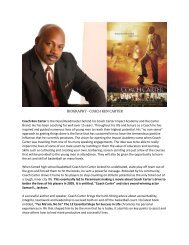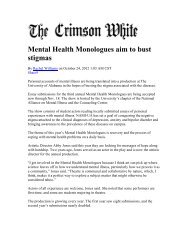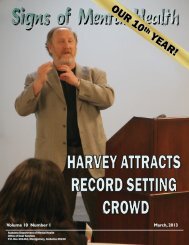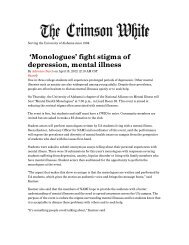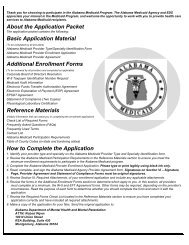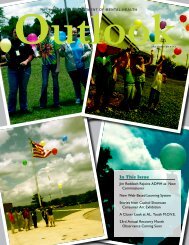Volume 7 Number 2 May, 2010 - Alabama Department of Mental ...
Volume 7 Number 2 May, 2010 - Alabama Department of Mental ...
Volume 7 Number 2 May, 2010 - Alabama Department of Mental ...
You also want an ePaper? Increase the reach of your titles
YUMPU automatically turns print PDFs into web optimized ePapers that Google loves.
(Continued from page 2)Why We Do It...Of course, when they have projects they need our support.The "Overcoming Communication Barriers" project with the<strong>Alabama</strong> Institute for the Deaf and Blind is an example. ODShas certain expertise that we can lend to AIDB. They helpus, we help them. The taxpayer saves money because AIDBdoes not have to duplicate services that the <strong>Alabama</strong> <strong>Department</strong><strong>of</strong> <strong>Mental</strong> Health is already providing.Providing opportunities for cross training between staff <strong>of</strong>the various agencies is also helpful. The Sign LanguagePr<strong>of</strong>iciency Interview training illustrates this principle. Sinceall agencies use the SLPI in hiring decisions, candidatesneed to have the assessment done in a timely manner. Butif each agency had to rely on its own team, it can bog downquickly, especially when one agency or another has a suddenrush to fill positions. (Think <strong>of</strong> school systems in thesummer.) Such cross-training also helps people understandthe parameters <strong>of</strong> service each agency operates under.An example <strong>of</strong> this would be the common misunderstandingthat ODS can provide "counseling" to any deaf person or thatVR should find any deaf person a job. Obviously that is nottrue, but <strong>of</strong>ten staff in various agencies forget that. Jointtraining allows occasional reminders that there are limitationsto what services can be provided, like reminding VRstaff that consumers have to have a severe mental illness tobe served by ODS, or reminding ODS staff that VR can onlywork with clients that are "employable" and that they alsohave acceptance criteria.The final group <strong>of</strong> things we do that fall into the "why do theydo that?" category are things that seem at first glance to be"social." C<strong>of</strong>fee Night is an example. Yes, one <strong>of</strong> the purposesis to create opportunities for our deaf staff to havesocial events outside <strong>of</strong> work, but that's not the sole, or eventhe main reason for the activity. They also create activitiesfor consumers and for sign language students. The benefitto the former is obvious, but the benefit to the latter isequally important, if less obvious. Sign language studentsbecome employee and interpreters. It's is the incubator <strong>of</strong>future services and service providers.So the next time you get an announcement for a workshopsponsored by ODS there is a good chance that our sisteragencies are heavily involved as well. It's good for us, goodfor the taxpayers and good to <strong>Alabama</strong>.Continued from page 9As I See ItWhy can't this person polish signing skills by either spendingquality time in the Deaf Community or by hiring an ASL mentor?Either way would remove the danger that lack <strong>of</strong> ASLskills will compromise treatment.Getting therapy from a student in supervision is one thing. Afully competent supervisor is responsible for the student'swork product. And we suppose that a deaf person who entersinto the arrangement could do so eyes wide open. But in thissituation, there does not appear to be a qualified supervisorand that makes it problematic.Bartering pr<strong>of</strong>essional services is as old as the hills, <strong>of</strong> course.A fully competent pr<strong>of</strong>essional providing service to anotherfully competent pr<strong>of</strong>essional in consideration <strong>of</strong> quid pro quois certainly ethical (if not always legal). Each pr<strong>of</strong>essionalperforms in a fully competent manner, giving full value <strong>of</strong> theirservice in exchange for the same from the other pr<strong>of</strong>essional.If someone were to provide counseling services to a plumberin exchange for plumbing work at home, this would not bealarming (except, perhaps, to the tax collector.)But this is not what is happening here. The deaf person isgiving full value (the sign language mentoring) but not receivingfull value from the therapist. If the therapist were payingthe deaf person for their time, no one would be objecting. Or ifthe deaf person were even freely volunteering the time, thiswould be just peachy. But under no circumstance would thetherapy be considered competent when the level <strong>of</strong> communicationis sub-par.But hey, the world has always ascribed either a substandardlevel <strong>of</strong> care for deaf people or a super human ability <strong>of</strong> deafpeople to make sense out gibberish. Only a very enlightenedfew would even think to analyze the inequity <strong>of</strong> this proposedarrangement.We doubt that any malfeasance is attached to this person'sintent. Not thinking it through, subconsciously subordinatingASL, and being really naïve about the likelihood <strong>of</strong> not causingharm to the consumers while he or she is "practicing signs",yes, but not malfeasance. Nevertheless, "practicing" on reallive consumers in real live therapy sessions without supervisionis not pr<strong>of</strong>essional. As I See It, our enterprising therapistwould be much better advised to cease therapy with deaf peopleand spend that time hanging out with good languagemodels who will happily help with ASL skills without the sham<strong>of</strong> pseudo-therapy.* P.S. Like in typing, it's not the speed, it’s the accuracy. Signs <strong>of</strong> <strong>Mental</strong> Health 10


